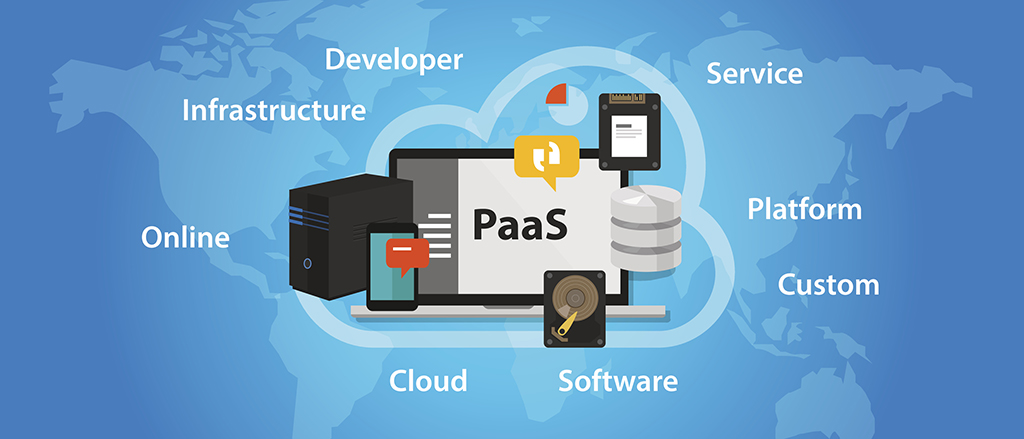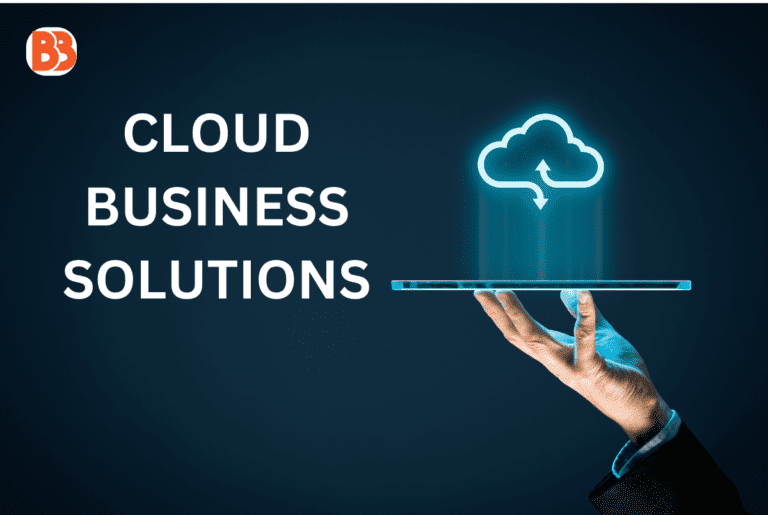Cloud Business Solutions are software, services, and tools that run on the cloud, which is a network of remote servers that store and process data. Cloud solutions offer many advantages for businesses, such as scalability, cost-effectiveness, and accessibility. In this guide, we will explore the different types of cloud solutions, their benefits, use cases, and challenges.
1. Types of Cloud Business Solutions
There are three main types of Cloud Business Solutions, depending on how much control and responsibility the user has over the underlying infrastructure:
1. Software as a Service (SaaS):
SaaS applications are hosted and managed by the cloud provider, and the user only needs a web browser to access them.


SaaS Cloud Business Solutions are ideal for collaboration, communication, and productivity. Some examples are Google Workspace, Salesforce, and Microsoft 365.
2. Platform as a Service (PaaS):
PaaS provides a platform for developers to create, deploy, and manage applications without worrying about the infrastructure.


3. Infrastructure as a Service (IaaS):
IaaS provides virtualized computing resources, such as servers, storage, and networking, on demand. The user has more control and flexibility over the infrastructure, but also more responsibility.


2. Benefits of Cloud Business Solutions
Cloud Business Solutions offer many benefits for businesses of all sizes and industries, such as:


1. Scalability:
Cloud Business Solutions can easily scale up or down based on the user’s needs, without requiring additional hardware or software.
2. Cost-effectiveness:
Cloud Business Solutions reduce the upfront and ongoing costs of owning and maintaining infrastructure, and the user only pays for what they use.
3. Accessibility:
Cloud solutions can be accessed from anywhere with an internet connection, enabling remote work and collaboration across teams and locations.
4. Automatic updates:
Cloud providers handle the maintenance and updates of the cloud solutions, ensuring that they are always up to date and secure.
5. Security:
Cloud providers implement robust security measures, such as encryption, firewalls, and backups, to protect the user’s data and applications.
3. Cloud Business Solutions Common Use Cases
Cloud Business Solutions can be used for various purposes and functions, depending on the user’s goals and requirements. Some common use cases are:


1. Customer Relationship Management (CRM):
CRM solutions help businesses manage their customer interactions, sales, and marketing activities. SaaS-based CRM solutions, such as Salesforce, HubSpot, and Zoho CRM, offer features like contact management, lead generation, email marketing, and analytics.
2. Enterprise Resource Planning (ERP):
ERP solutions help businesses streamline their core business processes, such as finance, human resources, and supply chain management. Cloud-based ERP solutions, such as SAP S/4HANA Cloud, Oracle Cloud ERP, and Microsoft Dynamics 365, offer features like accounting, payroll, inventory, and reporting.
3. Collaboration and Communication:
Collaboration and communication tools help businesses facilitate remote work and teamwork across different platforms and devices. Cloud-based tools, such as Microsoft Teams, Slack, and Zoom, offer features like chat, video conferencing, file sharing, and project management.
4. Data Analytics and Business Intelligence:
Data analytics and business intelligence solutions help businesses process, analyze, and visualize large and complex datasets for insights and decision making. Cloud-based solutions, such as Google BigQuery, AWS Redshift, and Azure Synapse Analytics, offer features like data warehousing, query processing, and dashboarding.
4. Cloud Business Solutions Challenges and Considerations
Cloud solutions also pose some challenges and considerations for businesses, such as:


1. Security:
Businesses need to ensure that their data and applications are protected and compliant with the relevant regulations and standards, such as GDPR, HIPAA, and PCI DSS. Businesses also need to be aware of the potential risks of data breaches, cyberattacks, and human errors.
2. Vendor lock-in:
Businesses need to choose their cloud providers carefully, as switching to a different provider can be costly and complex. Businesses also need to be aware of the terms and conditions of their cloud contracts, such as service level agreements, pricing models, and exit clauses.
3. Migration:
Businesses need to plan for a seamless migration from their on-premises or legacy systems to the cloud, minimizing the disruption and downtime. Businesses also need to consider the technical, organizational, and cultural aspects of the migration, such as data quality, compatibility, training, and change management.
4. Cost management:
Businesses need to monitor and optimize their cloud usage and spending, avoiding unnecessary or hidden costs. Businesses also need to compare and evaluate different cloud options and providers, based on their value and performance. Click here, if you want to read about, Navigating Security and Privacy in the Age of Human AI Pin
Frequently Asked Questions
Here are some frequently asked questions to learn about Cloud Business Solutions:
1. What are the benefits of cloud Business solutions for my business?
A: Cloud Business solutions can help you save costs, improve productivity, enhance security, and scale your operations. You can access a variety of software, services, and tools that run on the cloud, without having to invest in or maintain your own infrastructure.
2. How do I choose the right cloud provider and solution for my needs?
A: There are many cloud Business providers and solutions available, so you need to evaluate them based on your specific requirements, such as performance, availability, functionality, pricing, and support. You can also compare different options and read reviews from other customers.
3. How do I migrate my data and applications to the Cloud Business Solutions?
A: Migrating to the cloud can be a complex and time-consuming process, depending on the size and complexity of your data and applications. You need to plan ahead, backup your data, test your migration, and monitor your progress. You can also use tools and services that can help you migrate faster and easier, such as AWS Migration Hub1 or Azure Migrate.
4. How do I secure my data and applications in the Cloud Business Solutions?
A: Security is a key concern when using cloud Business solutions, as you need to protect your data and applications from unauthorized access, theft, or loss. You need to follow best practices, such as encrypting your data, using strong passwords, enabling multi-factor authentication, and updating your software. You can also use tools and services that can help you enhance your security, such as AWS Shield or Azure Security Center.
5. How do I manage and optimize my cloud usage and spending?
A: Cloud Business solutions can help you save costs, but you also need to monitor and optimize your cloud usage and spending, as you may incur unnecessary or hidden charges. You need to track your usage, set budgets and alerts, and review your bills. You can also use tools and services that can help you manage and optimize your cloud costs, such as AWS Cost Explorer5 or Azure Cost Management.
Conclusion
In conclusion, Cloud Business Solutions are transforming the way businesses create value. But only when they understand how to use them and change how they operate. Remember that each organization’s needs are unique, so evaluate cloud solutions based on your specific requirements. Whether you’re a startup, a small business, or an enterprise, the cloud offers a plethora of opportunities to enhance efficiency and agility.
Read more:
